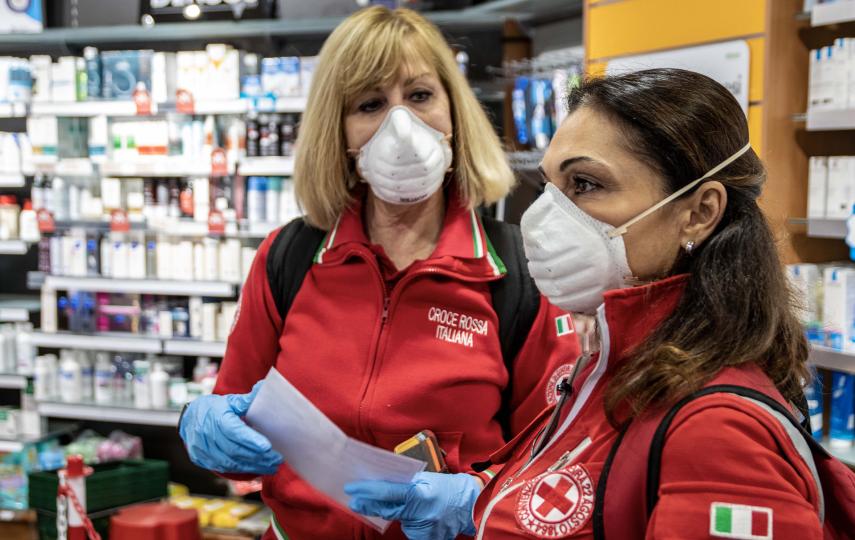More than 25 years ago, fresh out of nursing school, I sent a typed, grammar-riddled letter to Médecins Sans Frontières, keen to offer my expertise to communities in some of the world’s roughest hotspots. Little did I know that, one day, we’d be mounting operations across Italy, France, Spain, Switzerland, and Belgium in response to a pandemic. In a lightning turn of events, these are among today’s new crisis zones.
Yet even as COVID-19 exacts a devastating toll on Europe and the United States, crippling much-vaunted healthcare systems, we humanitarians must shiver at the thought of the destruction it may unleash on overburdened and frail medical facilities in countries where people already struggle to access healthcare.
Public health is a public good and a global good. Today, more than ever, it’s clear that we can only be strong collectively – our global health is only as strong as the health of those furthest behind, no matter where they are.
This is a rare moment that starkly illustrates how an overwhelmed healthcare system unable to deal with a virus like COVID-19 can lead to the deterioration of health among people who live half a world away. The hyper-connectivity of our world means that one undiagnosed case, or unidentified virus anywhere, can ignite a new pandemic within weeks – as is now clear from the way the coronavirus hotspot moved within weeks from Wuhan, China, to my region in Italy.
Let’s translate that hyper-connectivity to the effort we use to address this crisis, and others. We are facing an enemy that can only be vanquished through a collective strategy and a unified front – a solidarity ‘sans frontières’.
Here in Europe we’ve retreated into our homes, spending the past weeks hunched over screens, drawing up contingency plans, and worrying about things like “business continuity”. While trying to put on an air of normality, it’s hard to ignore how this pandemic has upended lives, including our own.
Only in late February, I was in Emilia Romagna, visiting my mother. Today, this region of Italy is plunged into one of the darkest crises my generation has known. The nightly clapping and serenading from balconies and windows belie a deeply felt collective trauma. We’re a people in mourning, utterly stunned by this disaster that has come swooping down with frightening speed.
Years of managing projects for displaced populations, HIV and TB patients, or those affected by the deadly Ebola outbreak of 2014, have shown me the lethality with which this pandemic can strike people – not only those whose immune systems are compromised by age or comorbidities, but also those who have withstood years of deprivation and who live in places where health systems will most likely collapse under the weight of a coronavirus-induced crisis.
COVID-19 has already exposed – and may even accentuate – the inequalities among people and across European countries. The virus may not “choose” one host over another, but the response measures will likely hit certain groups of people disproportionately. Prolonged confinement during lockdowns is already robbing some people of livelihoods, while others continue to enjoy the privilege of tele-commuting.
So, as I tele-commute from my safe home confinement to coordinate teams to plan for COVID-19 response across the countries where I work, I think about the people in those places and how their lives may change yet again. I thought I knew how it felt to be confronted with a pandemic. But for the first time, perhaps, I can sense what it might feel to live through a crisis.
“The virus may not ‘choose’ one host over another, but the response measures will likely hit certain groups of people disproportionately.”
COVID-19’s punishing impact on some people in Italy, Spain, and other countries reveals how the virus mercilessly feeds on vulnerabilities, the elderly or people with pre-existing conditions, to name a few. For those in years-long displacement – Somalis stuck in camps while dealing with chronic health conditions; or the elderly and internally displaced in Ukraine grappling with hypertension; or those surviving on HIV antiretrovirals, like our patients in Myanmar – COVID-19 could be fatal.
We are doing all we can to care for our patients. But addressing the medical and social consequences of this pandemic over the coming weeks and months will demand a society-wide effort – both in Europe and around the world.
For now, the measures put in place to curb the spread of the virus are, paradoxically, impacting our ability to prepare for the next COVID-19 outbreak. Travel restrictions are hindering our ability to move specialised staff to places where they might be needed most. And, with supply lines ruptured, importing essential items like medicines and personal protective gear has become increasingly difficult, limiting our capacity to respond to a COVID-19 outbreak.
In some places, we’re already struggling to maintain our regular medical activities, and we fear ongoing care for our patients will be disrupted.
So, in this gravest of times, it’s all the more important to keep lifelines of solidarity alive and kicking. Movement of essential medical supplies and specialised staff must continue unhindered, and we must strive to collaborate across national and organisational boundaries.
Over time, COVID-19 may well be contained if not banished. But the choices we make today in response to this pandemic will stay with us.
We can decide to isolate ourselves, to care only about those closest to us. Or we can choose to reach out to our neighbours, to those across borders. Social distancing alone will not help us overcome the virus; solidarity that extends beyond race, class, and national boundaries just might.
Subscribe to our coronavirus newsletter to stay up to date with our coverage.





